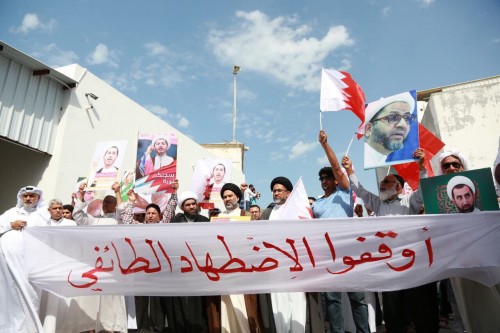Bahrain’s Ruling Al Khalifa Family Internationally Condemned for Escalating Sectarian Strife

2016-10-19 - 1:25 am
Bahrain Mirror (Exclusive): The Bahraini regime continues to evade any political reform by portraying the national opposition parties in the island kingdom as "foreign-fueled chaos." This has been occurring since the 1920s, yet what is new is that, this time, the ruling Al Khalifa family has joined a sectarian regional conflict led by the Kingdom of Saudi Arabia, the main supporter- which destroys any hope for political reconciliation in the near future.
The Al Khalifa family, which is ruling a country with a Shiite-majority population, has taken advantage of its monopoly over power to mobilize the "Sunni Gulf states" to support it in its attack on the pro-reform movement in the country. It was not long before this tactic, adopted in 2011 to crush the Arab Spring-inspired Bahraini uprising, turned into an inclusive strategy aimed at targeting everything that represents the Shiite sect, from religious or political institutions and figures, to religious beliefs, amid the escalation of the conflicts in Syria, Iraq and Yemen.
These ongoing oppressive measures taken by the government have urged four prominent Shia clerics- who have avoided over the years the use of sectarian or religious expressions in their statements for national and Islamic considerations- to issue a statement explicitly declaring that the "Shiite component is being targeted in its very existence". This was the first statement of its kind given by the four top Shia religious scholars in Bahrain: Ayatollah Sheikh Isa Qassim, Sayyed Abdullah Al-Ghureify, Sheikh Abdulhussein Al-Sitri, and Mohammad Saleh Al-Rabiee.
"As a main and indigenous component of this nation (the Shia component), we are now strongly convinced that we are being targeted in our very existence, identity, beliefs, rituals and [religious] duties," stressed the clerics in a brief statement.
Similarly, a group of United Nations human rights independent experts announced that they are deeply concerned by "the systematic harassment of the Shia population by the authorities in Bahrain."
"The intensified wave of arrests, detentions, summons, interrogations and criminal charges brought against numerous Shia religious clerics and singers, human rights defenders and peaceful dissidents is having a chilling effect on fundamental human rights," they stressed.
"Shias are clearly being targeted on the basis of their religion," the experts highlighted.
The UN experts further criticized "the dissolution of Al-Wefaq National Islamic Society, the shutting of faith-based organizations, restrictions on the practice of religious rites, on Friday prayers and peaceful assemblies, restrictions on movement, restricted access to the Internet and a ban on Shia religious leaders from preaching."
The issuance of such statements shows that Bahrain is heading towards a worrying track according to the United Nations. Despite that, the Bahraini regime has followed Saudi Arabia's suit, as Riyadh continues to confront any opposing international stances. Saudi Arabia has recently won a battle against the United Nations after it was added to a blacklist for its involvement in the killings of hundreds of Yemeni children.
The UN experts were not the only ones to voice their concern. The US State Department also announced in its latest report on religious freedoms that the "the Sunni-led government continued to question, detain, and arrest Shia clerics, community members, and opposition politicians [...] The government also prosecuted Shia political figures on charges, which the international media and nongovernmental organizations (NGOs) reported were politically motivated."
"In April the Court of Cassation upheld the dissolution of the Islamic Ulema Council (IUC), the main assembly of Shia clerics in the country," the report highlighted.
The US report noted that "Shia leaders stated Sunni citizens often received preference for government educational scholarships, employment as teachers, and employment in government positions, especially in the managerial ranks of the civil service and the military."
For its part, Human Rights First (HRF) said that Bahrain continues to attack the leading Shia clerics in the country, stressing that this targeting of Shia religious leaders clearly "fuels Bahrain's polarization and undermines efforts to combat sectarianism."
"The Obama Administration should be doing more to prevent this. The country's military is armed, equipped, and trained by the United States yet remains virtually an exclusively Sunni force," highlighted Director of Human Rights Defenders at Human Rights First, Brian Dooley.
"The [US] State Department should withhold further support for the security forces until significant progress has been made to integrate the country's majority Shia population into the police and army," he added.
The Al Khalifa ruling family has made many efforts and PR stunts, attempting to promote that it is behind saving the country from a sectarian Shia-Sunni conflict, since the eruption of the Bahraini uprising. The Bahraini Foreign Minister Khalid bin Ahmad Al-Khalifa has claimed on February 18, 2011 that the raid on the protestors camping at the Pearl Roundabout in the capital Manama was "necessary to prevent the country from slipping into the pit of sectarianism."
Such attempts and endeavors; however, failed to fulfill their aim as the international community today finds that the Al Khalifa family is abusing its power and alliances to deprive the Shia citizens of their basic human rights, which could fuel an unpredictable sectarian conflict that threatens the future of the Gulf kingdom.
- 2024-05-08Bahrain: One Step Forward, Two Steps Back
- 2024-05-06Ali Haji May Face Imprisonment Again on Charges of "Penetrating a Restricted Area"
- 2024-05-01Was the Resumption of Flights with Iraq Expected?
- 2024-04-20Recent Releases in Bahrain: Something Has Changed
- 2024-04-04Return of Repression to Bahrain's Streets with the Crown Prince and Prime Minister's Blessing